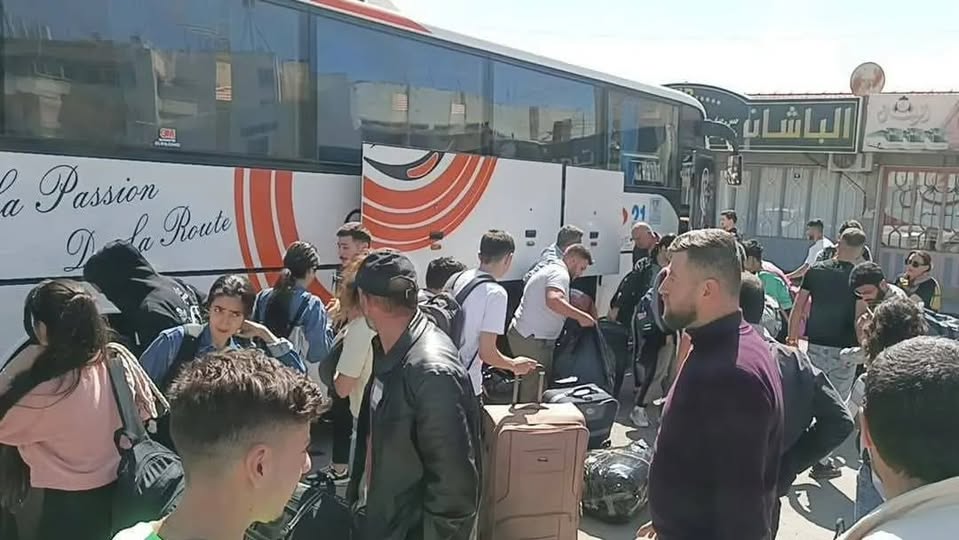Tensions flared in Syria’s southern Suweida province on Thursday after an armed group prevented a convoy of university students from traveling to Damascus to attend classes at Qalamoun University, citing concerns over their safety. The incident has reignited debate over security, sectarian tensions, and the right to education in a region still reeling from recent unrest.
Students Barred from Traveling
According to local media outlet Suwayda 24, buses carrying students were intercepted at the city’s main transit terminal. Despite mediation efforts by families and transport companies, the armed group refused to allow the students to depart, leading to verbal confrontations and forcing many to return home.
In response, Qalamoun University extended the exam period by one week and reassured students that its Damascus campus remains secure. University officials noted that there were no official restrictions on travel between Suweida and the capital. Nonetheless, local actors within the province voiced skepticism, citing fears of renewed violence and a broader sense of insecurity.
Community Divided Over Response
The incident has underscored a growing divide within Suweida’s Druze-majority community. While many families and educators have urged a return to academic normalcy—calling on authorities to ensure safe passage for students—others advocate caution, pointing to lingering concerns about potential sectarian violence and the inadequacy of state protection.
Qalamoun University, one of Syria’s leading private institutions, draws over 60% of its student body from Suweida. Several students emphasized that returning to campus should be a personal decision made in consultation with their families, but reaffirmed their right to pursue uninterrupted education.
Governor Offers Support, Eyes Local University
Suweida Governor Dr. Mustafa al-Bakkour appeared on official media to affirm his commitment to student safety, even stating his willingness to personally accompany students to their universities. He pledged to implement any plan proposed by local families to guarantee secure and dignified access to campuses.
Bakkour also revealed that discussions are underway to establish a private university within Suweida, aiming to reduce the risks associated with travel and to decentralize higher education access.
In coordination with the Ministry of Higher Education, the governor announced the creation of student liaison committees at various universities to maintain direct lines of communication with security officials in the event of threats or incitement—whether on campus or online.
Crackdown on Sectarian Incitement
The Ministry of Higher Education has issued a directive banning the circulation of content that promotes sectarianism, racism, or incitement to hatred. The ban applies to faculty, students, and staff across all public and private universities. Violators face disciplinary action—including expulsion—or legal prosecution.
The decision follows a wave of online content that intensified fears of sectarian targeting, particularly of Druze students studying in Aleppo, Homs, and Damascus. These concerns were heightened by recent clashes in Jaramana, Sahnaya, and Suweida, which fueled rumors of targeted harassment.
While official sources have denied the existence of systematic attacks, reports indicate that two students sustained minor injuries in separate incidents in Homs and Aleppo. Though isolated, these events have been amplified by social media campaigns portraying them as evidence of widespread persecution.
Authorities Restore Calm, Pledge Safe Corridors
Authorities announced that security has been restored along the Damascus–Suweida highway and that safe corridors have been established for students and civilians. The move follows operations against groups responsible for recent unrest—some of which reportedly had links to religious figures and armed factions accused of seeking foreign backing, including from Israel.
Despite a return to relative calm, concerns remain about attempts to exploit the situation for political or sectarian purposes, including through disinformation and foreign interference.
Balancing Security and Education
As Suweida’s students remain caught between anxiety and aspiration, the government faces growing pressure to restore public trust and ensure unimpeded access to education. While calls for caution persist, many within the community insist that education must not become collateral damage in a climate of instability and polarization.
As one Qalamoun student put it: “We just want to study. Our future shouldn’t be decided at a checkpoint.”
This article was translated and edited by The Syrian Observer. The Syrian Observer has not verified the content of this story. Responsibility for the information and views set out in this article lies entirely with the author.


